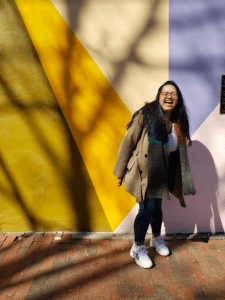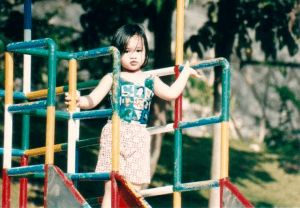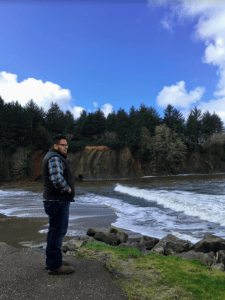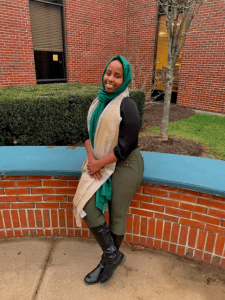
Mar 13, 2020 | Feature |
Andrea Swiedom Staff Reporter
When people ask senior Samantha Rose Aloba Melgar where she’s from, they’re rarely satisfied with her initial response of the Gardiner/Augusta area. Often, they ask her again with an emphasis on from. “I feel like I have to explain because I don’t belong to one place. To me, where you are from is such a heavy question,” Aloba Melgar said. “I assume they’re asking where you are originally from and I don’t know. I am just used to telling people the Philippines-Maine-Texas-Maine story.”
Aloba Melgar moved to Augusta with her mother and older brother from Cebu City, Cebu, Philippines when she was nine years old. Her mother had remarried a man from Maine and they arrived during a Jan. snowstorm. “It was my first experience of snow because in the Philippines there’s only a wet and dry season, and I was just looking around really fascinated,” Aloba Melgar said.
While she’s still fascinated by snow, she admitted that that’s about as far as her appreciation goes for Maine winters. “I like it when it first initially snows,” Aloba Melgar said with her fingers dancing in mid-air to mimic snow falling. “But the cold that comes with it and when it gets dirty…” she trailed off shaking her head in discomfort.
She experienced a short break from New England winters when she was 11 years old after her mother’s divorce led the family to move to El Paso, Texas where they reconnected with extended family members. For the first time since living in the United States, Aloba Melgar was amongst Filipino Americans. “There is a community here in Maine, but we’re not really a part of it. It was nice in Texas to get to know them and not have it be as scattered as it is here in Maine,” she said.
Exposure to Filipino culture in Texas brought back nostalgic memories of Aloba Melgar’s early childhood in Cebu where large family gatherings consistently took place several times throughout the month. “I do miss the physical gathering of us together,” she said. “Sometimes we would go to the beach. Mostly, we would either go to someone’s house or go to a restaurant together.”

Samantha Melgar. Photo Courtesy of Samantha Melgar.
Aloba Melgar’s face lit up as she described the strong tradition surrounding food at family reunions and one of the dishes her mom still makes regularly at home called pancit, a noodle dish similar to chow mein that is quickly fried with vegetables and seasoned with soy sauce.
“Food is a big thing in the Philippines, we love to share food. We just love food, and I think that transcends beyond any language,” Aloba Melgar said. Although, she admitted that she has struggled to carry on her culture’s culinary traditions in an attempt to avoid washing dishes.
While in El Paso, Aloba Melgar joined a Christian church and was baptized in the Protestant faith while her mother remained Roman Catholic, the primary religion in the Philippines. While this was not a dramatic change, it does demonstrate how Aloba Melgar’s identity often reflects her dual origins of the United States and the Philippines.
“There are views that formed while I grew up here, and there are views that stayed with me that I learned from the Philippines. I’ve noticed in Western culture, you guys like independence very much and by the time you’re 18, you’re expected to go off,” she said. “Usually in the Philippines, for my family anyway, you stay with the family and usually the older sibling takes care of the parents.”
Aloba Melgar considers herself Generation 1.5, which refers to immigrants who moved to the U.S. as adolescents. “You’re not really a generation one, and you’re not a generation two; you didn’t entirely grow up in the States,” she said. “So you are both, battling with two identities.”
Aloba Melgar still has vivid memories of her childhood in the Philippines and how certain aspects were ironically unaffected by place. She played with Bratz dolls and princess Barbies and binge-watched Disney movies.
But she also reflected on aspects of her childhood that were unique to the society and culture in the Philippines. “We would play hide-and-go-seek in the woods with a lot of bugs or go into abandoned houses,” she said. “I could say, ‘Mom, I’m gonna be gone and I will come back later,’ and it was usually fine. I don’t think it was dangerous, there was never an idea that there was a dangerous situation.”
Aloba Melgar also remembered the cost of education and the strain it had on her mother who was determined to keep her and her older brother in school.
“We were a middle class family in the Philippines, but there was a time when my mom’s salary was not enough, and my mom had to pick between me and my brother,” she said. “My mother sat me down once and told me that I might have to stop school, and I started crying. Luckily that didn’t happen. My mom moved me to a different school that was cheaper.”
Aloba Melgar’s family spent a short year and a half in El Paso before returning to Maine which seemed to be beckoning them back. “I think we just met the right people, and that really contributed to why we came back and stayed here.”
After graduating from Cony High School in Augusta, Aloba Melgar enrolled at UMF to pursue psychology after breaking the news to her mother that she would not be going to school for nursing. “I was going to go to USM, but then out of nowhere, I realized that I didn’t want to become a nurse because that is more of what my mom pushed me to do. Nursing is actually a Filipino stereotype,” she said, chuckling.

Samantha Melgar as a kid in the Philippines. Photo Courtesy of Samantha Melgar.
Her mother supported her interest in counseling, but as Aloba Melgar studied psychology she found herself more drawn to social work. She also realized that her mother had imprinted some career ideas on her that were still intriguing such as working for the United Nations or the Peace Corps.
When Aloba Melgar was still considering nursing in high school, she always imagined traveling for work. She started exploring international social work options and that’s when she learned that the Peace Corps was essentially just that. “I wanted more experience before going into grad school and I was just exhausted with academia.”
Aloba Melgar applied to the Peace Corps last semester and will be returning to the Philippines in early July for the first time since she was nine years old to work as a youth development facilitator.
“I am going to be working with elementary age to even up to college age people, just helping them with education, to access resources, with positive identity and vocational skills, with critical thinking and healthy lifestyle activities, with mentoring and workshops.”
For the next two years, Aloba Melgar will be reintroducing herself to a place that she considers to be a significant part of her identity. “I want to explore and go back to where I started. I just want to see the changes,” she said. “I want to make connections again with the culture and see how I will react to it now that I’ve spent more than half my life here in the U.S.”

Feb 29, 2020 | Exclusive |
Andrea Swiedom Staff Reporter
When sophomore Antonio Cortez, 36, brought his wife to his parent’s house for the first time, she thought his brothers were initiating a spontaneous sleepover after dinner as they pulled out pillows and blankets. Cortez had to explain that was just their bed.
“I grew up sleeping on a living room floor,” Cortez said. There with him were his four brothers in a one bedroom apartment in Anaheim, CA.
In hopes of providing a better future for their children, Cortez’s parents crossed the border from Southern Mexico. “They wanted their American-born children to go to college,” Cortez said.
In 2002, Cortez enrolled in a vocational program in Orange County, CA where he earned an associates degree in mechanical engineering while working full-time as a cement mason. But he always had military service in mind as a back-up plan. By 2004, it became his best option. “Eventually I just got to the point where, we were struggling, we needed health care. It was really the lure of the financial assistance.”
Cortez’s wife was struggling with health problems and the hospital bills were continuously draining their savings. “I made up to 30 bucks an hour, but it seemed like every time we visited the hospital it was a couple thousand dollars,” Cortez said.

Antonio Cortez (Photo Courtesy of Antonio Cortez)
To cover the costs of education and healthcare, Cortez worked 60 hour weeks and saw the physical effects that decades of masonry had on those around him. “I saw a guy doing it for 20 years and he was calloused and sunburnt,” Cortez said, scrunching his fingers. “I thought, I don’t know if I want to do this for the rest of my life.”
Cortez’s first step towards military service was complete happenstance. He was running errands with his father one afternoon when their car got a flat tire. While waiting for roadside assistance, Cortez found himself staring into the window of a recruitment office. A recruiter came outside and convinced Cortez to apply and take the Armed Services Vocational Aptitude Battery (ASVAB) test right then and there.
Within a week of the test, Cortez, determined to pursue the most intense level of training, jumped at a last minute opening for a Ranger Airborne spot and left for Army Ranger school.
“They do SERE training which is survival, evasion, resistance and escape and you go through psychological warfare,” he said. “They lock you in a dog kennel, spray you with a hose. . .it’s just seeing how far you can go before you break. You want to be the guy that doesn’t break, but eventually you do.”
Cortez was deployed in Baghdad, Iraq where he manned an old yacht house-turned army base with 12 other American soldiers and 25 Iraqi police. “It had marble floors, a marble staircase and it was all shot up,” he said. “The water was murky brown. It was half mercury and if you ate the fish in the river, you would get jaundice.”
While in Baghdad, he sustained a severe leg injury from a grenade attack while riding in a truck back to the base. He was wounded by what he described as a molten needle that penetrated the three inches of steel and electrical system of the truck before shattering his knee.
“I couldn’t bend my leg; I thought it was gone. I couldn’t feel most of the left side of my body,” Cortez said while gingerly rubbing the side of his left leg.
After eight years of military service, getting shot in the back and jumping out of airplanes, this was ultimately the injury that led to his medical discharge.
“Most of my military career was like, ‘Hey, you’re alive now. Just get through it to get back to hot dogs and Budweiser,’” Cortez said with a straight face.

St MèreÉglise Drop Zone, Fort Bragg, N.C. (Photo Courtesy of Antonio Cortez)
After his recovery, he spent 30 days in a military out-processing program primarily geared towards retirees and left him with little information as to what benefits and services were available to him as an injured veteran coming straight out of combat.
The lack of information influenced his desire to volunteer with veteran programs to inform others about resources available to them as they transition to civilian life.
“I have spent most of my time since the military trying to figure out how to make up for some crummy things I had to do, not necessarily by choice,” Cortez said.
At UMF, he’s studying rehab management with the ultimate aim to work with veterans dealing with post-combat issues.
Cortez landed in Farmington by happenstance just as he ended up in the military. After leaving the army in 2012, he spent several years soul searching. He worked various jobs in the automotive industry and as a millwright designing and welding custom kitchen suites. Once again, he found himself overworked and burnt out.
With some pension funds and the desire to travel, Cortez, his wife and 12 year old son hit the road in an RV traversing the country three times before ending up at a campsite in Canon, Maine. It only took three months at the seasonal site for the family to realize that Maine was home, and Cortez’s son was ready to attend a public school.
“We love small town life. We just like rural because people want to help you just because they want to help,” Cortez said. “People here are just generally great, and it’s beautiful here.”
He expressed a great appreciation for the UMF campus and the relationships he’s formed with professors due to the open atmosphere and small class sizes.
“Farmington is UMF, and UMF is Farmington. And it’s cool that the public is allowed to use the facilities and the gym,” Cortez said. “It’s really a community.”

Feb 17, 2020 | Feature |
Andrea Swiedom Staff Reporter
When Khadija Tawane was seven years old, she fought off her first hyena by waving a stick at the predator while it bit into the back leg of one of her lambs. She didn’t let on to any remembrance of fear, she just laughed and shrugged her shoulders nonchalantly. “Hyenas smell the fear of a human, so we were taught to be brave and strong when we see them.”
Fearlessness was integral to Tawane’s childhood as she herded her family’s livestock- camels, donkeys, goats, sheep and chickens- to water and grazing areas, often walking 15 miles a day in Hagadera, one of three refugee camps in the eastern Kenyan town of Dadaab.
Tawane’s parents left their home in Somalia in 1990 during the early years of the country’s ongoing civil war and walked to what is now the world’s third largest refugee complex. “They fled with their animals, but they had cows and the cows died along the way,” said Tawane.
Her parents still had other livestock when they arrived which provided them with milk, meat and eggs. Tawane’s father began cultivating watermelon and vegetables and the family sold their surplus in exchange for Kenyan shillings that were saved up for the monthly trek into the city center where staples like rice were packed onto the backs of their donkeys.
The livestock provided them with an immediate financial advantage, but the animals were also a part of the family. “I miss my camel,” Tawanee said as she admired a Google picture of a young woman holding the reins to her camel in the Hagadera Camp. Tawane has no pictures of the first twelve years of her life in Kenya, and as she scrolled through internet photos of her home, she went silent and seemed to be lost in the images.
The Tawane name lived on a bulletin board for four years amongst thousands of others until the family of 10 was randomly selected for relocation in Dallas, Texas in 2009.

Khadija Tawane (Photo courtesy of Khadija Tawane)
“When we arrived in Dallas, we didn’t speak English. There were people holding a sign with my father’s name. It was scary, we were all holding hands. We thought we weren’t going to see each other again. When we went into cars, the boys went into a car, and the girls and my mother went into a car.”
Tawane and her siblings felt as though they had experienced the end of the world. “We had this image, like when people leave this place, you were gonna die, you’re done. I don’t know about my parents though.”
Tawane had experienced a dramatic end to the one world she had known, but a new world was just beginning for her: fifth grade in the United States.
“I knew it was a school and I came to learn, but I didn’t feel like I belonged there. And first of all, we grew up wearing long dresses and long hijabs, not t-shirts. And there was a dress code, and sometimes they said no hijabs and my dad had to ask them [to change the dress code].”
Tawane and her siblings would gorge themselves every morning on their mother’s breakfast so that they could avoid the school lunch. “We were afraid there was going to be pork in there,” Tawane said. They were in a completely foreign environment and they couldn’t communicate yet, so it was easier to abstain from the food rather than accidentally consume meat that is considered unclean in Islam.
The family relocated to Lewiston, Maine the next year where Tawane found herself amongst a community of people with similar experiences who even spoke the same Maymay Somali dialect as her. She entered the sixth grade determined to learn English and spent half of the school day in an English Language Learner Program (ELL).
“There were classes just for ELL learners, and everybody spoke different languages, and we were all put in one classroom. But I didn’t want that setting, I wanted to learn the language. I really wanted to be in classrooms where people spoke english with me. I just kept going, and I just remembered the reason we came here was for a better education and a better life.”
While most of Tawane’s peers remained in ELL classes until their sophomore year of high school, Tawane advanced out of the program by eighth grade. She would stay after school everyday and wouldn’t go home until she completed all of her homework.
Tawane attributes her rapid progress in ELL from her Islamic homeschooling taught by her older brother in Hagadera. “Memorization was my key to learning language,” Tawane said, who spent considerable time listening to her brother recite the Qur’an in Arabic and memorizing the verses.
Tawane was also determined to learn about the new society and social norms that she was now a part of, and she giggled telling me she watched a lot of American television. “I also did a lot of sports, cross country, soccer, and softball. But I got a black eye, so only one year of softball, and a year of lacrosse.”
When it came time to think about college, it was never a question of if, but where. “I always wanted to continue my education. That was just my mindset. I didn’t even think oh, people can go in different directions. My mindset was just college. Back in my country, education is the key to success.”
Tawane was accepted to all six colleges that she applied to, but ultimately chose UMF because she already had family here and at the time, she wanted to pursue teaching. She has since changed her major to Psychology.
“I think it’s because the exams that I have to take to become a teacher kind of scare me and also, I realized I don’t want to be in school for the rest of my life,” Tawane said. “And I like to be around children, but maybe if I just had my own office.”
Tawane, now a sophomore, is still happy she chose UMF even though she is no longer pursuing teaching, but the lack of diversity does affect her on a daily basis. “I don’t have a lot of people like me in my classes and I feel like I am standing out. And my professors expect me to speak because they want opinions from different people, and I feel like I am on the spot all the time.”
There are also very basic cultural aspects that Tawane finds herself missing. She showed me Google photos of what the houses look like in Hagadera, camel skin tarps stretched over wooden posts with dried grass mats to cover the sandy ground. They were each one room, large and round shared spaces.
“It’s a different feeling. Here, everybody is put into their own room, but there, you get to talk to your family and you get that bonding. You don’t get that here.”
Nonetheless, Tawane expressed the innate ability to make a home out of any environment.
“Wherever I can find a bed and food, that’s where I call home. And Kenya is home for me.”




